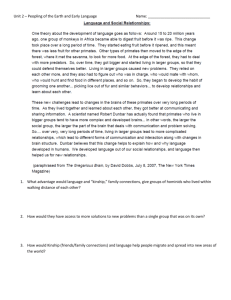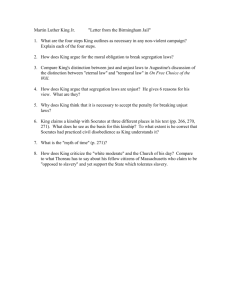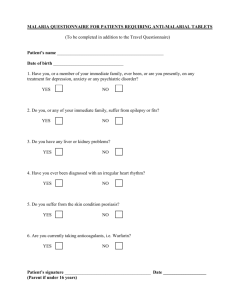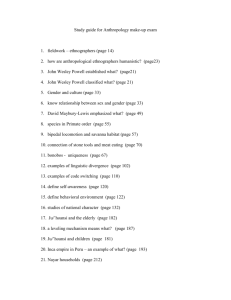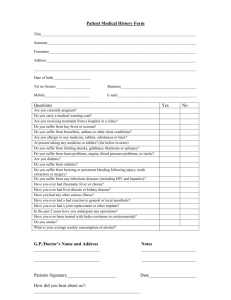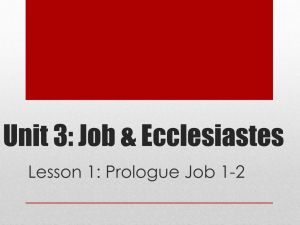Book of Job and the Passion of the Christ and Christian Religions
advertisement
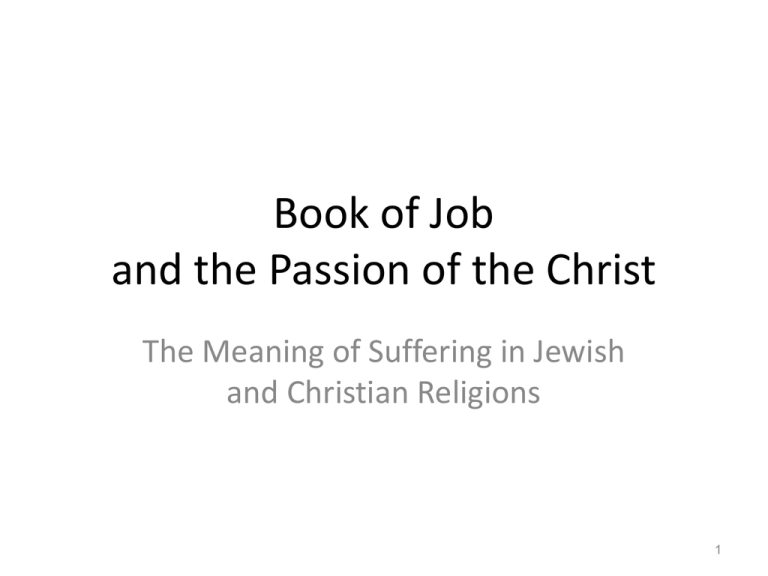
Book of Job and the Passion of the Christ The Meaning of Suffering in Jewish and Christian Religions 1 Contrast between Jewish and Sumerian religions • 1) Sacred Marriage is at heart of religion for early agricultural peoples – Reflecting prominent role of women in early agriculture – Continues early nature consciousness of animism • 2) Meeting with God demands sexual purity for Hebrew herders: don’t go near a woman! – Reflecting patriarchal nature of herding societies – Transcendence of God: outside of nature and its sexuality • 3) “Abrahamic” religions (including Christianity and Islam) continue this tradition 2 Kinship guilt to the fourth generation • “For I the Lord your God am an impassioned [jealous] God, visiting the guilt of the parents upon the children, upon the third and upon the fourth generations of those who reject Me, but showing kindness to the thousandth generation of those who love Me and keep My commandments.” • Kinship and generational guilt or blessing Why do people suffer? • God punishes those who break his commandments to the fourth generation, and rewards those who obey, to the thousandth. – Kinship society: the individual is bound up with the group – Legal society: the individual is independent of others, and so the others should not suffer for the wrongs of their kin • Teleology: in general, we suffer because we do wrong – As individuals, in a legal society – As members of a kinship group 4 Stages of the problem • 1) People suffer because they commit evil acts – Recall the story of Noah • 2) But then why do good people suffer? – 1) Book of Job – 2) Book of Isaiah • (1) First interpretation • (2) Second interpretation 5 Why do good people suffer? • But good people—who obey all the rules of morality—still suffer. • How explain this? • => Book of Job 6 Temptation of Job • • • • Satan’s conversation with Yahweh Yahweh: one man is still loyal to Me 1st trial of Job 2nd trial of Job 7 Job proclaims his innocence • “When I gazed on the sun in all its splendour, on the moon in her royal progress, did these things steal my heart away, so that mouth kissed hand in adoration? That were great wrong done, to deny the God who is higher than all.” 31:26-29 • =He does not follow the nature worship of the surrounding pagan agriculturalists • But this is difficult: he must resist the appeal of animism which he deeply feels 8 Job’s Purity open to All-seeing Eyes of God • 31:1-7 And this was a man that had bound his eyes over by covenant; never should even his fancy dwell upon the thought of a maid! Well I knew that God Almighty in high heaven would have neither part nor lot with me else; ruin for the sinner his doom is, disinheritance for the wrong-doer. • =sexual purity 9 God Sees All • “Tell me, does not this God watch over every path I take, trace my footsteps one by one? Walk I by crooked ways, run I eagerly after false dealing, he can weigh my offence with true scales; let God himself bear witness to my innocence!” (Job 31: 4-6) 10 Monotheism and Evil • No problem of evil in polytheism: cause of the flood in Gilgamesh • Problem: Only when God is One, all-powerful, good (ethical) 11 One life or many lives? • Normal explanation of suffering: you brought it on yourself by your evil actions – “I didn’t do anything to deserve this bad life.” – Perhaps not in this life . . . (Karma and rebirth) • But Job believes he has only one life – He does not believe in an afterlife 12 One life to live: Job protests! • “Bethink thee, Lord, it is but a breath, this life of mine, and I shall look on this fair world but once; when that is done, men will see me no more, and thou as nothing. Like a cloud dislimned in passing, man goes to his grave never to return, never again the homecoming, never shall tidings of him reach the haunts he knew. And should I utter no word?” (7:7-11) 13 Alternatives • If God is just, and Job suffers, then Job must have done something wrong. • If Job suffers, and he did nothing wrong, then God must be unjust. 14 Modern (Western) Alternative • • • • A) If God is good and all powerful B) then good people should not have to suffer C) But good people do suffer (unjustly). D) Therefore there is no God 15 Job’s alternative • This possibility of atheism is unthinkable to Job – Recall: modern science rejects purpose, teleology, and so God or gods – Isn’t it better to have evil purposes than no purpose at all (modern nihilism)? • The issue of the time: many gods, or just one? • Therefore if an all-powerful God allows unjust suffering, He must, logically, be unjust (not Good) • Therefore, God is evil or unjust 16 Job: God is Unjust • “Why does he look on and laugh, when the unoffending, too, must suffer? So the whole world is given up into the power of wrongdoers; he blinds the eyes of justice. He is answerable for it; who else?” (9:23-4) 17 Jehovah’s Answer • “Then, from the midst of a whirlwind, the Lord gave Job his answer: Here is one that must ever be clouding the truth of things with words ill considered! Strip, then, and enter the lists; it is my turn to ask questions now, thine to answer them. 18 • “From what vantage point wast thou watching, when I laid the foundations of the earth? Tell me, whence comes this sure knowledge of thine? Tell me, since thou art so wise, was it thou or I designed earth’s plan, measuring it out with the line? 19 • “How came its base to stand so firm; who laid its corner-stone? To me, that day, all the morning stars sang together, all the powers of heaven uttered their joyful praise. Was it thou or I shut in the sea behind bars? 20 • “No sooner had it broken forth from the womb than I dressed it in swaddling-clothes of dark mist, set it within bounds of my own choosing, made fast with bolt and bar; Thus far thou shalt come, said I, and no further; here let thy swelling waves spend their force.” • (Job 38: 1-11) 21 God is Above Human Measurement • Utter transcendence of God (above nature) • Versus immanence of divine for animists and early agriculturalists: – divine is found in the moon, the sun, the snake, in sexual experience, etc. 22 Historical context • Hebrews still continue early kinship, and so have a strong feeling for animism • But they reject the surrounding paganism, with its animism • Hence: nature expresses God’s power, wisdom, etc., – But God is even more wonderful than the moon and sun – And yet God is not remote, but is involved in the lives of his people 23 Proper attitude: faith (=trust) • God is above our human scales of justice – But not entirely: ultimately, justice prevails • => Basic attitude: faith, trust – Faith is not believing that God exists: the modern issue – but trusting that in the ultimate justice of God, rewarding the good and punishing the wicked 24 Justice … in the end • Justice will be achieved in the long-term, but not always in the moment – Current suffering is a test of one’s faith – Ultimately the faithful will be rewarded: • Job finally gets his reward, and dies happy, surrounded by his large family 25 Compare to Stoicism • “In piety towards the gods, I would have you know, the chief element is this, to have right opinions about them, as existing and as administering the universe well and justly—and to have set yourself to obey them and to submit to everything that happens, and to follow it voluntarily, in the belief that it is being fulfilled by the highest intelligence.” Epictetus #31 • = We should not try to understand the plan of God for this world: it is utterly beyond us. • We should accept even slavery as God’s will for us. 26 Judaism v. Stoicism • =Kinship justice of Jews requires this-worldly, physical, emotional, generational rewards. – Physical, bodily happiness is part of real human life. – We cannot be happy in sickness, poverty, loss of family and friends, slavery or captivity. • =>Justice of God requires earthly happiness for good people—ultimately – Hence he liberates his people from oppression – Jewish history: early freedom is lost, and then regained! • > There is a purpose to life and history that we can understand – =“the gift of the Jews” 27 Need a Deeper Theory of Suffering • What about the faithful servant of God who goes to his death? • How is this a “test”? • Where is the reward if there is only one life? 28 Suffering Servant of Isaiah (53) • • • • • Who hath believed our report? … Despised and rejected by men; A man of sorrows, and acquainted with grief… he was despised, and we esteemed him not…. We did esteem him stricken, smitten by God, and afflicted. 29 • But he was wounded for our transgressions; • He was crushed for our iniquities; • Upon him was the chastisement that brought us peace, • And with his stripes we are healed. 30 • All we like sheep have gone astray; • We have turned every one to his own way; • And the Lord has laid on him the iniquity of us all. • He was oppressed, and he was afflicted, • Yet he opened not his mouth; • Like a lamb that is led to the slaughter… 31 • • • • • He was cut off out of the land of the living, Stricken for the transgression of my people…. There was no deceit in his mouth. Yet is was the will of the Lord to crush him; He has put him to grief. 32 He sees the reward for his actions: a just society on earth • He shall see the travail of his soul, and shall be satisfied; • by his knowledge shall my righteous servant justify many; for he shall bear their iniquities. • Therefore will I divide him a portion with the greater, • and he shall divide the spoil with the strong; • because he hath poured out his soul unto death … and he bare the sin of many, • and made intercession for the transgressors. 33 Semi-Otherworldly solution • The suffering servant is rewarded in another sphere (afterlife, heaven) • He is immortal—his happiness is in “the next life” • But this happiness still depends on happiness in this life. – The servant sees the triumph in this life of the cause he died for • => Justice must still be this-worldly, but is combined with an other-worldly dimension – Justice in this world is still primary 34 Two interpretations of Isaiah • 1) His death in itself is what saves others – Like the sacrificial lamb or scapegoat of Jewish temple practices • 2) He dies opposing and fighting against injustices (he speaks truth to power) – It is not his death in itself that saves people – Ultimately by his death as a result of opposing injustice (martyrdom) he inspires the people to reject injustice – And so the cause of justice finally triumphs in this life through the creation of a just society 35 Is Jesus the Messiah? • Recall Jewish history of freedom and enslavement – 1) Moses against Egyptians 1200 BCE – 2) Cyrus against Assyrians, Babylonians 6-500 BCE – 3) And now the Romans: 1-33 CE – Who will save us? • A new anointed one, a new liberator, a new King, should come. – Messiah = anointed one, “Christos”: a King – =“Son of God” 36 “Son of God” • 2 Samuel (or Kings), the Lord God so designates King David: “I will prolong for ever his royal dynasty; he shall find in me a father, and I in him a son.” 7:13-14. – Son of God = the king • Nathanael answered and said to Him [Jesus], "Rabbi, You are the Son of God! You are the King of Israel!" (John 1:49) 37 Problem of the death of Jesus • But Jesus does not become the King of Israel (=he is not the Messiah-Christ, “Son of God”) – He is crucified – the shameful death of a criminal – On his cross: “Jesus of Nazareth, King of the Jews” (= Roman joke) • One reply: God sacrifices his own Son to save sinners from their deserved punishment • = Isaiah’s suffering servant (first interpretation) is a prophecy of Jesus 38 Propitiation for our sins • “In this is love, not that we have loved God but that he loved us and sent his Son to be the propitiation for our sins.” 1 John 4:10 • “God put [Christ] forward as a propitiation by his blood, to be received by faith. This was to show God’s righteousness, because in his divine forbearance he had passed over former sins.” Paul to Romans 3:25. 39
